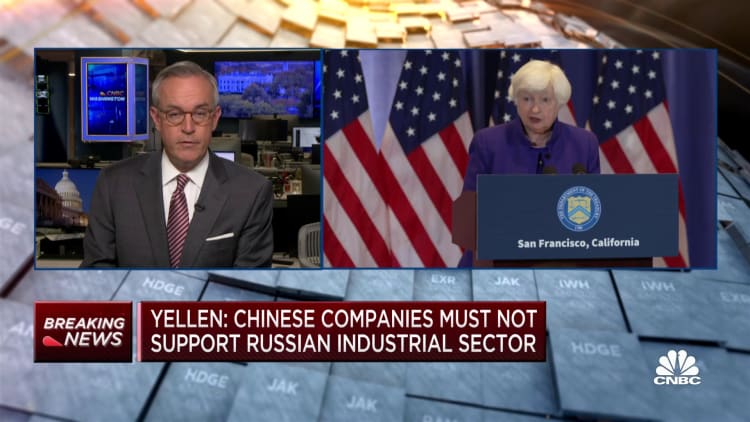U.S. President Joe Biden shakes hands with Chinese President Xi Jinping as they meet on the sidelines of the G20 leaders’ summit in Bali, Indonesia, November 14, 2022.
Kevin Lamarque | Reuters
BEIJING — After another rocky year of U.S.-China tensions, the two countries’ presidents are set to meet this week in person for the second time since Joe Biden took office.
It will be a rare summit before the U.S. presidential election cycle kicks off in earnest. Taking a tough stance on China, the second-largest economy in the world, has become one of the few areas of bipartisan agreement. Biden plans to run for reelection.
“The focus will be on expanding dialogue in order to low[er] tail risks in the relationship and prevent a crisis that neither leader is looking for,” said Michael Hirson, head of China Research at 22V Research.
“Flashpoints such as Taiwan and the South China Sea need to be managed carefully,” he said. “For that reason the meeting is still important, especially ahead of a politically charged 2024 that will begin with an important presidential election in Taiwan in January and end with the U.S. presidential election.”
U.S.-China tensions have escalated over the last several years, beginning with tariffs under the Trump administration and spilling over into broader tech restrictions under the Biden administration.

Controversy in early February over an alleged Chinese spy balloon flying in U.S. airspace revealed how fragile relations have become — the incident pushed the two countries to suspend already limited high-level talks.
In April, during that period of estrangement, Washington, D.C.-based think tank Center for Strategic and International Studies published a report that described U.S.-China relations as seemingly “caught in a worsening vicious cycle.”
“This translates into a stalemate—and, in fact, spiraling tensions—that go even further than the typical ‘security dilemma,’ in which each side takes steps to defend itself which in turn generate insecurity for the other, who then responds in kind,” the report said.
The immediate aftermath of the [Biden-Xi] meeting is likely to mark a cyclical high point for bilateral relations
Sentiment began to improve over the summer after U.S. Secretary of State Antony Blinken finally made a high-stakes visit to Beijing in June, followed by visits from several other senior officials.
In early October, U.S. Senate Majority Leader Chuck Schumer and five other U.S. senators representing both the Republican and Democratic parties had an 80-minute meeting with Chinese President Xi Jinping.
But both sides are still waiting for more action.
“The current trend in China-U.S. relations is one of easing,” said Shen Yamei, director of the department for American Studies and an associate research fellow at the China Institute of International Studies.
“This easing is a relaxation of the atmosphere,” she said in Mandarin, translated by CNBC. “No actual changes have occurred.”
Export controls
During this week’s meeting, Shen expects the Chinese side to bring up U.S. export controls and investment restrictions.
The Biden administration has restricted U.S. companies from selling high-end tech, primarily in semiconductors, to Chinese companies and sought to curb U.S. investments in such Chinese tech.
U.S. Commerce Secretary Gina Raimondo in a trip in August had “said no” to China’s requests to reduce the controls and called the them “matters of national security.”
Chinese Vice Premier He Lifeng also raised the issues during preparatory meetings with U.S. Treasury Secretary Janet Yellen in San Francisco on Nov. 10, according to state media.
“Aside from Taiwan, export controls are Beijing’s top concern, but there is no political space in Washington roll back existing controls,” Gabriel Wildau, managing director at consulting firm Teneo, said in a note.
“The immediate aftermath of the [Biden-Xi] meeting is likely to mark a cyclical high point for bilateral relations,” he said. “The key question is whether this high point extends into a plateau or whether political pressures trigger a new cycle of deterioration,” he said. “As previously discussed, the period since June has offered a window of opportunity to stabilize relations; following the meeting, this window may close.”
Taiwan is set to hold its presidential election in January, and a more pro-independence winner could stir more of Beijing’s ire.
Beijing considers Taiwan part of its territory, with no right to independently conduct diplomatic relations. The U.S. recognizes Beijing as the sole government of China but maintains unofficial relations with Taiwan, a democratically self-governed island.
While speaker of the U.S. House of Representatives in August 2021, Nancy Pelosi became the highest-ranking U.S. official to visit Taiwan in 25 years. The trip prompted Beijing to suspend talks on climate with the U.S., one of the few areas of potential cooperation.
Areas of cooperation
The Biden administration has said the U.S. is in competition with China, while looking to ensure that it “does not veer into conflict.”
“The Biden-Xi meeting might include a pledge to cooperate or establish a new formal bilateral working group on safe use of artificial intelligence,” Teneo’s Wildau said.
He added that “the two leaders may pledge to cooperate and coordinate on providing humanitarian aid to Gaza, ensure smooth passage of grain through the Black Sea, and support postwar reconstruction in Gaza and Ukraine.”
The U.S. remains China’s largest trading partner on a single-country basis.
However, Shen pointed out that trust between the U.S. and China is still quite low.
“No one believes what [the other] says now,” she said.
Paving the way
Goodwill efforts have increased in the weeks leading up to the planned summit on Wednesday local time between Biden and Xi in San Francisco, alongside the Asia-Pacific Economic Cooperation meeting.
For example, more direct flights between the U.S. and China are resuming from a low base.
Chinese commodity importers in October signed the first agreements since 2017 to buy U.S. agricultural products in bulk, according to a release from the U.S. embassy in Beijing.
China’s Ministry of Commerce last week announced it was gathering information in an effort to address unequal treatment of foreign businesses in China versus domestic ones — a longstanding business complaint.
However, on the cultural front, the three remaining giant pandas in the U.S. on loan from Beijing returned to China last week due to an expiring contract. China has lent pandas to countries around the world as a diplomatic tool.
And in a rather dramatic buildup to this week’s high-level meeting, China only confirmed Xi’s forthcoming travel plans on Friday night — just as the Philadelphia Orchestra was wrapping up a performance in Beijing to commemorate the 50th anniversary of its concert in the country in 1973.
That was a period during which the U.S. started to formalize its relationship with Communist-run Beijing. The two normalized relations in 1979.
Biden and Xi both sent letters for the 50th anniversary concert, which were read ahead of the performance.
“Despite all the ups and downs, the Philadelphia Orchestra continues to come to China,” Matias Tarnopolsky, president and CEO of the Philadelphia Orchestra, told reporters after the concert on Friday.
“Even in the worst of times the Philadelphia Orchestra came and in the best of times the Philadelphia Orchestra came,” Tarnopolsky said. He said the orchestra plans to return to China in 2024, and in the years following.
 EU News Digest Latest News & Updates
EU News Digest Latest News & Updates


